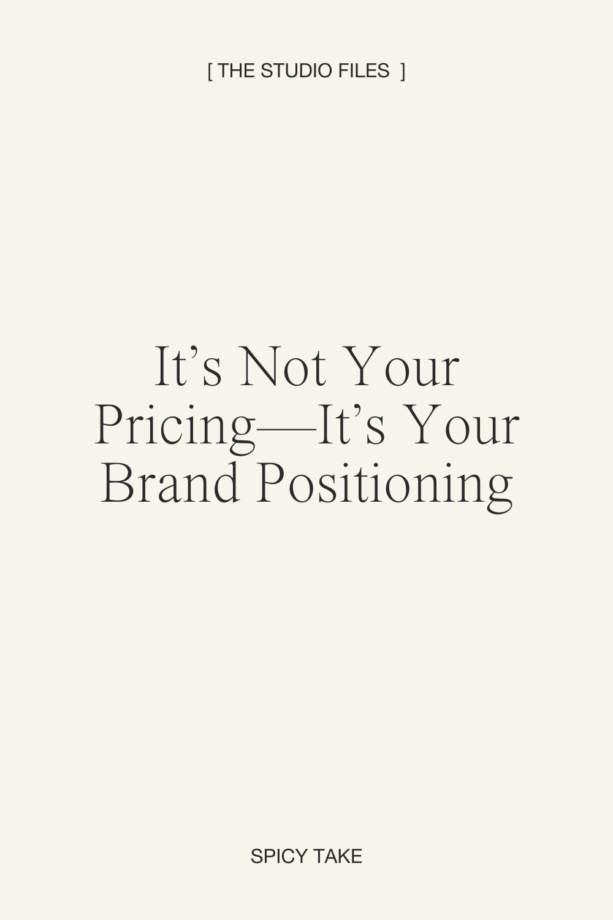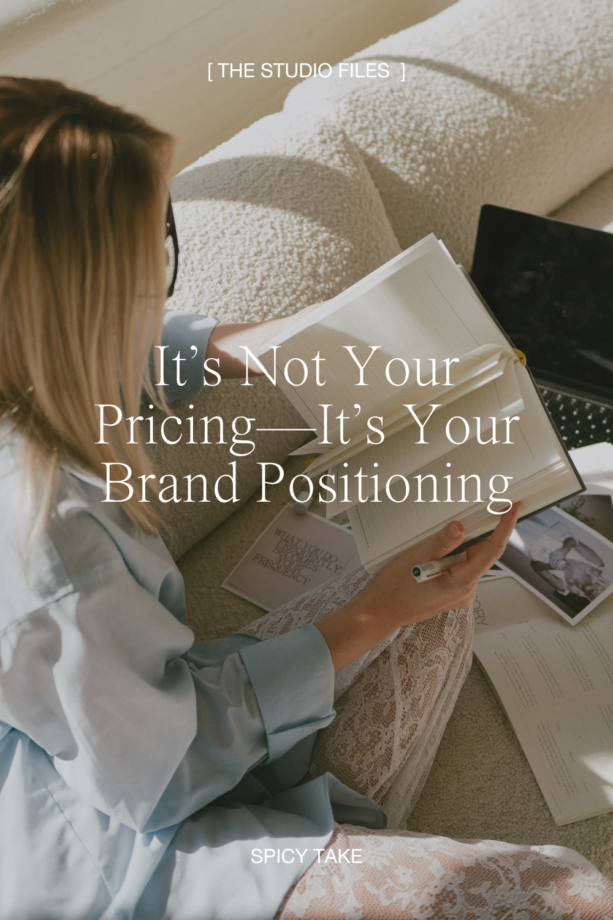Okay, imagine this: you’re on the hunt for the perfect white tee. At H&M, it’s $10. Over at Abercrombie, it’s $30. Wander into Ganni, and you’re looking at $100-$150. And The Row? That tee is $350.
Now, let’s be honest—how different are these tees, really? Sure, there might be some variation at the lower end, but once you hit the higher price points, they’re probably not wildly different. And yet, you wouldn’t walk into The Row, grab a tee, and say, “Can I get this for $15?”
Why? Because The Row already told you what it’s worth—calmly, confidently, and without a single word of justification. You’re not just buying a white tee. You’re buying the experience, the ethos, and the lifestyle the brand embodies.
Now, stay with me here, because this cute analogy is actually the same for you and your business. Whether you’re photographing love stories, designing floral works of art, or planning the dreamiest weddings, your work isn’t just the deliverable; it’s who you are, what you represent, and how your work makes people feel. So, why are some people able to book $15k weddings while you’re stuck at $4k?
My spicy take of the month: It’s not your pricing that’s the problem. It’s your brand positioning.

But first, what is Brand positioning?
Brand positioning is the intentional space your business claims in both the market and your clients’ minds – it’s how you choose to be known, remembered, and sought after. It’s not just what you do or even how you do it—it’s the why behind it all, the feeling you evoke, and the story you tell without saying a word. It’s the way your brand takes up space in someone’s mind, quietly defining why you’re the one for them.
Strong brand positioning makes your dream clients feel like you just get them. It shapes their perception of your value before they ever see a price tag. It’s in your visuals, your tone, your messaging—it’s the sum of every single thing that represents you.
Brand Positioning > Price, Every Time
Pricing matters, of course. It’s business 101 to align your offers with what your dream clients can afford, and your prices need to accurately reflect the value you bring to the table. But, if you focus too much on pricing—obsessing over what others are charging or micro-managing every possible lead, fearing you’re “too expensive”—you will inevitably start second-guessing yourself.
The best brands—the ones that seemingly effortlessly attract a community of devoted fans—don’t beg for approval. They let their brand positioning do the heavy lifting. When your dream clients encounter your brand, they should just know. Without you having to say a word. Without you having to convince anyone. That’s the power of positioning.
The three dangers of playing the pricing game:
The second you let affordability be the centerpiece of your brand, you’re setting yourself up for trouble. Here’s why:
1. It’s a slippery slope
There will always, always be someone cheaper than you. And if you start competing on price, it’s hard to stop. Lowering prices might seem like a good strategy to get more clients in the short term, but here’s the catch—once people expect you to be “affordable”, it’s hard to change that perception.
When you play the pricing game, you’re locking yourself into a race to the bottom. And in the world of building a business that aligns with your dreams rather than your fears, the bottom is not where you want to be. You’re building a brand to attract clients who care about the experience, not just the cost—and those clients need to feel that from the very first moment they meet you
2. It dilutes your brand.
Your pricing sends signals about your value—whether you realize it or not. If your brand is positioned as the “affordable” option, people will inevitably associate it with lower quality, even if that’s not the truth. In the high-end services space, perception is everything.
Think of it this way: it’s rare to ever see The Row have a 25% off sale, because their brand isn’t about affordability. It’s about exclusivity, quality, and sophistication—and that’s the vibe they want to convey.
The same is true for your own business. When your messaging gets tangled up in pricing, it pulls attention away from the things that truly make your brand special. If the first thing you communicate is “cheap!,” it becomes harder to position yourself as the trusted expert offering a high-end experience. And it’s those things—your artistry, your connection, the experience you create—that your dream clients are craving.
3. It chips away at your confidence.
This is the part no one likes to talk about, but it’s real: if you don’t feel solid in your pricing, it shows. And that uncertainty? It has a way of sneaking into your emails, your proposals, your Instagram captions. Even if your work is incredible, potential clients will be able to pick up on the doubt.
I worked with a wedding photographer recently who was in this exact spot. Her work was gorg, and she had raving reviews and tons of experience. BBut her prices were too low because she kept telling herself, No one in my area will pay more than this. I have to stay competitive. That limiting belief was showing up in her messaging—until she watched another photographer in her area (with less experience) start charging more than her and booking consistently. She was frustrated, of course—but it revealed the truth: her fear of charging more had been a story she’d been telling herself all along.
Unless you have a healthy relationship with your prices (and with money in general), you’ll always be living in scarcity. Your imposter syndrome will have deep roots, despite your obvious talent, hard-earned skill, and years of experience.
And that’s why brand positioning is so, so important——it shifts the conversation entirely away from price comparison and into the distinct value you bring, letting you break free from the scarcity spiral.

The Magic of Brand Positioning
So, what’s the true takeaway? The goal is to create a brand so clear, so aligned, and so you that the right clients can feel it from the start.
Here’s what that looks like:
- Stop explaining your worth. Let your brand speak for itself. Put intentional strategy behind the way you show up, so that your work, your words, heck, even your color palette, is speaking to the level of your service, before you even open your mouth. Trust that the right people will see it and connect to it. (PS. You also need to make sure the work you showcase represents the type of work you want to attract – so clean up that portfolio!)
- Accept that you are not for everyone. You’re not here to be the cheapest option. You’re here to create unforgettable moments for the clients who get it. That means that you may only book a fraction of inquiry calls that you take. Be okay with that. My general rule of thumb is if you’re booking 75% or more of your inquiry calls, your prices are too low. I like to aim for 30% to 50%.
- Let your messaging do the heavy lifting. Your words should quietly yet confidently communicate your value, drawing in the right clients without you having to convince anyone. From your website to your inquiry process, each interaction should naturally guide your dream clients toward that moment of knowing they’ve found exactly what they’re looking for. And if you’re not sure how to do that, that’s where I can help. I quite literally specialize in transforming your vision into tangible touch points that make your brand feel effortlessly elevated. So, let’s chat.
When you position yourself with clarity and confidence (I know you’re tired of negotiating lower packages), you don’t have to spend energy justifying your prices. The right clients will feel it—they’ll see your work and think, Yes. This is exactly what I’ve been looking for.
And here’s the best part: they won’t ask, “Why are you so expensive?” Instead, they’ll say, “How soon can I book you?”
And that, my friend, is the magic of positioning.
If you’re not sure how to align your brand with the clients you dream of working with, I’d love to help.


Spicy Take: Your Pricing Isn’t the Problem– It’s Your Brand
files:
